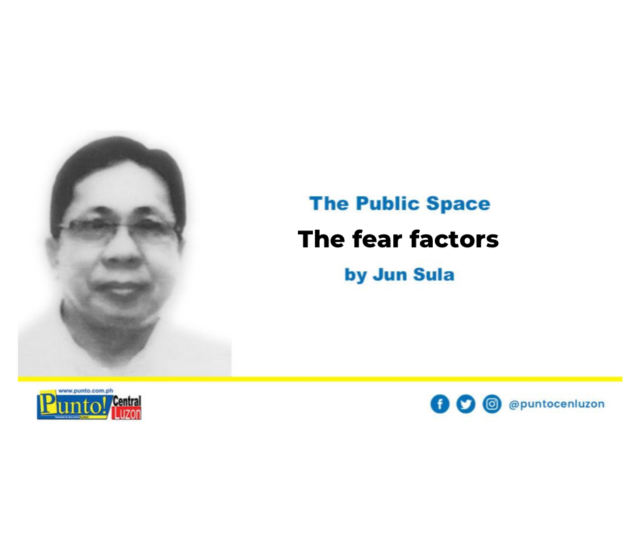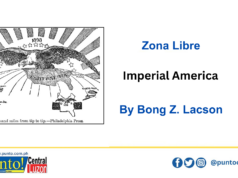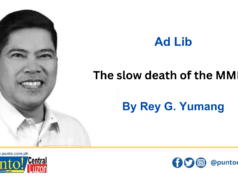A few days ago, I had a brief conversation over the phone with Joyce Del Rosario, executive director of the Pampanga Chamber of Commerce and Industry (Pamcham) over the state of business in the province.
There’s a government loan package worth P2 million offered to small businesses hit hard by the pandemic, she said. Under the package, availment can be had from P100,000 to P500,000 with a moratorium or grace period of six months before repayment begins.
That’s the good news. The bad news is, no one appears to be interested. The reason: we’re in a recession, which means there’s more fear than confidence they can repay because customers are far and few between. Ergo, there’s no clear revenue stream to pay the loan with.
Joyce, an economist, understands the situation very well. It’s simple micro-economics, she said. (The “stupid” part of the message is implied). It’s the behavior of individuals in a given setting that affects the economy.
She attributes two things to the recession, which has resulted in a 16 percent contraction of the economy, according to experts. The first thing is that a lot of people have lost their jobs and, therefore, have lost their purchasing capability. The other thing is that those with money to buy don’t, out of fear of catching the dreaded virus.
People with money face not unlike a Hamletian dilemma: to buy or not to buy. That seems to be the lingering question and the answer can be gleaned from the recent economic performance under duress by the pandemic scare.
PAMCHAM eggheads led by Rene Romero have asked prominent economist Bernardo Villegas to help them come up with a solution to the economic conundrum and lessen the impact of the prevailing fear factor. COVID-19 is not a mere grime on the economy but a real scare.
Until this question is resolved, business may have to stay on the guarded side of optimism. To be sure, P2 million seems a pittance when compared to how much has been lost by local business to pandemic and how much is needed to shore them up back to life or sustainability.
The overarching concern is for government to make living with the virus possible with greater confidence and a lot more safe in the absence of a vaccine that will protect everybody. The WHO has made that clear enough: don’t simply look forward to the vaccine but improve the health and medical response to it.
That desired confidence, however, is yet to be achieved with government’s perceived inability to flatten the curve after the back and forth on the alphabet soup of lockdowns, especially in Metro Manila and other areas.
So far, not only is the virus is still with us but is rearing its ugly “thorns”, and government is still grappling with disaster after more than six months of wreacking havoc on people’s lives.
The COVID 19 virus is not the only fear factor under which we live today. There are others, like the fear generated by the anti-terror law and the President’s constant threats, especially to advocates of human rights and free speech.
Others who have been adversely affected by China’s unbridled encroachment on the country’s territories in the West Philippine Sea are as much bothered by the China-originated bug as the harsh effects of tolerated, if not unwitting consent — ours– on Chinese documented bullying in the area.
Come to think of it, utmost in most people’s mind today (think of the 27 million plus Filipinos who lost their jobs due to the pandemic) is how to live, how to survive, more than anything else.
In other words, threats and intimidations are basically irrelevant to the problems at hand, even aggravating rather than easing them. They don’t create jobs or incomes, for one. They create unnecessary anxieties and fear in people’s mind.
With less than two years left to the Duterte Administration, there should be a paradigm change in the direction of governance. The need of the hour is to lessen the miseries of the people, insteading of adding more to their unremitting burdens, especiallyof the poor who get the double whammies of the pandemic: they can’t get out or won’t while the rich simply won’t. Besides, there’s online delivery service as an option.
Maybe it’s about time the President surrounded himself with micro-economists to better understand the behavior of people in times like the pandemic crisis and adjust the gears and levers of government to address their concerns and needs in a Lincolnian way: government for, by and of the people.
Pathetics statements like ‘it could have been worse’ can only make people feel even worse. This kind of blithe optimism is a disservice because it reduces people to mere statistics and doesn’t really encourages solution to people’s sufferings. It’s a non sequitur, therefore, a fallacy.
You can’t govern or lead effectively based on falsehood.





